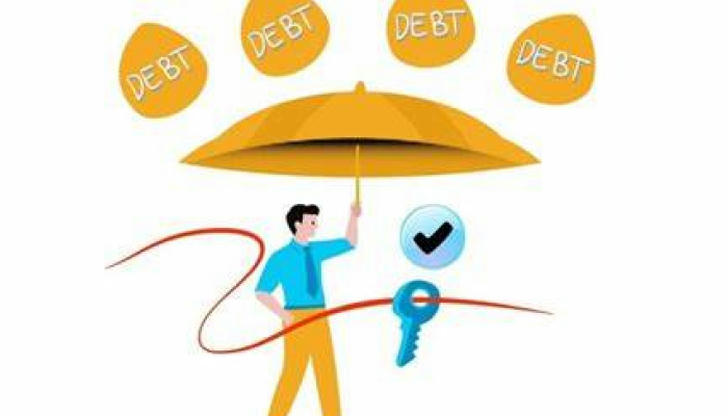Debt insurance: an effective guarantee for solving financial difficulties
In modern society, debt problems have become a part of many people's lives. Whether it is personal consumption loans, mortgages, or credit card debts, many people are more or less under certain debt pressure. Especially in the event of emergencies, such as unemployment, illness or accidents, many people may not be able to repay their debts on time, which will not only affect personal credit, but may also lead to more serious financial crises.

In order to cope with this risk, debt insurance has emerged as a financial protection tool, which can help borrowers provide necessary support and protection when they are unable to repay on time.
Basic concepts of debt insurance
IDebt insurance is a special insurance product designed to protect borrowers from being able to repay their debts on time in the event of unemployment, major illness, accidents, etc. This type of insurance product can usually help borrowers avoid repayment difficulties caused by emergencies, thereby avoiding credit crises or other financial problems.
Debt insurance can cover many types of debts, including mortgages, personal loans, credit card debts, etc. Its main function is to ensure that borrowers can continue to fulfill their debt obligations when they encounter unexpected unemployment, serious illness or injury, avoid debt backlogs, and reduce the negative impact caused by unpaid debts. After the borrower purchases this type of insurance, the insurance company will assume part or all of the debt repayment responsibility to reduce the borrower's financial burden.
Although the concept of debt insurance is relatively simple, its market demand is gradually increasing because it can effectively deal with sudden financial risks, especially in periods of economic fluctuations.

Types of debt insurance
Debt insurance is not a single insurance product. It is divided into many forms according to the different protection content and risk types. The following are several common types of debt insurance:
1. Unemployment insurance
Unemployment insurance is the most common type of debt insurance, especially for individuals with long-term loans, such as mortgages, car loans or consumer loans. If the borrower loses his job or cannot find a new job due to an economic recession, unemployment insurance will provide protection to ensure that the borrower can still repay the loan on time during unemployment.
This type of insurance usually covers a few months or a year after the borrower loses his job, and the specific compensation period depends on the terms of the insurance contract. It is worth noting that many unemployment insurances have strict restrictions on the reasons for unemployment, and the insurance will only take effect in the case of involuntary unemployment. That is, you may not be able to get compensation due to resignation or other voluntary resignation.
2. Disease insurance
Major diseases or sudden illnesses may make it impossible for the borrower to continue working, thus affecting the ability to repay the debt. At this time, disease insurance can help the borrower reduce the financial burden and ensure that the loan can still be repaid on time during the illness. Disease insurance usually covers major diseases such as cancer, heart disease, and stroke, ensuring that the borrower continues to fulfill the repayment obligation when sick.
This type of insurance is particularly important for those with a family history of serious diseases, and can provide certain financial protection for possible health problems in advance
3. Accident insurance
Accident insurance mainly protects the borrower from disability or death caused by accidents. Whether it is a traffic accident, a work accident, or a sudden accident in life, accident insurance can help the borrower continue to fulfill the debt repayment responsibility when he is physically injured or loses the ability to work.
Usually, accident insurance will pay according to the severity of the accident. If the borrower is unable to continue working due to disability caused by the accident, the insurance will pay a certain amount according to the contract to help the borrower tide over the difficulties.
4. Life Insurance
Life insurance is usually an additional product of debt insurance, which aims to guarantee the repayment of debts after the unfortunate death of the borrower. If the borrower dies, the life insurance will pay a certain amount of insurance money to repay the debts left behind by the borrower and prevent family members from suffering financial difficulties due to debts.
For borrowers with heavy family burdens, life insurance is an important protection tool. It can not only provide financial support for family members and prevent debts from becoming a heavy burden on the family, but also ensure that the survivors of the borrower can still maintain a stable standard of living without financial support.

Advantages of Debt Insurance
1. Relieve the financial pressure caused by emergencies
One of the biggest advantages of debt insurance is that it can effectively relieve the financial pressure brought by emergencies to borrowers. For example, when a borrower loses his job or has an accident, debt insurance can provide him with the necessary financial support to help him continue to repay his debts and avoid affecting his quality of life or credit status due to financial difficulties.
Through debt insurance, borrowers can avoid being unable to repay their debts when facing sudden difficulties, maintain a good credit record, and thus avoid the legal and economic consequences of debt default.
2. Ensure the financial security of the family
When many people take on debt, their family is also an important part of their repayment responsibility. Especially when there are children, elderly people or other dependents in the family, if the borrower encounters misfortune, the financial situation of the family may be greatly affected. By purchasing debt insurance, borrowers can ensure that in the event of an accident or death, their family will not face a greater financial burden due to unpaid debts.
or example, life insurance can pay debts for family members when the borrower dies, avoiding family members from getting into trouble due to debt problems.
3. Maintain personal credit
The impact of debt default on personal credit is far-reaching. A poor personal credit record will not only affect future borrowing ability, but may also affect other aspects of life such as employment and renting. However, debt insurance can ensure that borrowers can still fulfill their repayment obligations and maintain a good credit record in the event of an unexpected event.
Credit scores are crucial in modern society. Debt insurance effectively helps borrowers maintain their credit stability by ensuring that borrowers continue to fulfill their debt obligations.
4. Reduce legal disputes and debt problems
Failure to repay debts in a timely manner may lead to a series of legal disputes and debt collection, which will not only bring huge economic pressure, but also may affect the borrower's daily life. Debt insurance can effectively avoid this situation and help borrowers reduce the legal risks caused by the inability to repay debts.

How to choose suitable debt insurance
1. Determine personal risk needs
When choosing debt insurance, borrowers should first evaluate their financial situation and potential risks. If the borrower is the main source of income for the family and has long-term liabilities such as mortgages or car loans, then life insurance or unemployment insurance may be a better choice. If the borrower is worried about health problems, major disease insurance is particularly important.
2. Understand the insurance terms
The coverage, deductible, payment period and other terms of debt insurance may vary greatly. Borrowers need to read the contract carefully to ensure that the selected insurance covers all possible risks and avoid those terms that may limit compensation.
3. Choose a reputable insurance company
There are many insurance companies on the market that provide debt insurance products. Borrowers should choose those with good reputation and adequate claims services. By understanding the insurance company's evaluation in terms of customer service, claim settlement speed, etc., borrowers can find the most suitable insurance plan.

Future Outlook of Debt Insurance
As the social and economic environment changes, the debt insurance market will continue to develop. In the future, as people's debt levels increase and the demand for financial protection continues to grow, debt insurance products may become more diversified and personalized. Especially driven by digital and intelligent technologies, the sales, claims and service processes of debt insurance will become more efficient, and policyholders will enjoy more convenient protection services.
In short, as a financial management tool, debt insurance can help borrowers maintain financial stability in emergencies and protect the economic security of themselves and their families. Choosing the right debt insurance can effectively reduce debt pressure and allow borrowers to manage their personal and family finances with more peace of mind.
